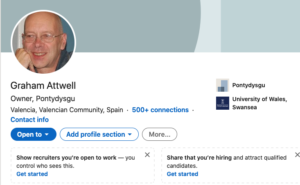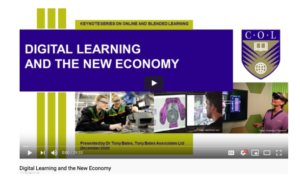October 25th, 2007 by Dirk Stieglitz
Wales Wide Web is Graham Attwell’s main blog. Graham Attwell is Director of the Wales based research organisation, Pontydysgu. The blog covers issues like open-source, open-content, open-standards, e-learning and Werder Bremen football team.
You can reach Graham by email at graham10 [at] mac [dot] com
24 Comments »
March 18th, 2021 by Graham Attwell
 I’ve had a few queries lately about whether Pontydysgu can still take part in European projects. With regard to Erasmus Plus I’m afraid the answer for Pontydysgu UK is no. It seems that the UK were invited to continue as part of Erasmus plus on the same basis as Norway paying into the project funding. But the UK government refused on the basis that it was too expensive. According to gossip the UK wished to continue with student exchanges but not participate in the Erasmus projects and the EU, not unreasonably in my view, said it was all or nothing. They have replaced Erasmus plus with the Turing scheme which, they claim, will be backed by over £100 million, providing funding for around 35,000 students in universities, colleges and schools to go on placements and exchanges overseas, starting in September 2021. As opposed to the European basis for Erasmus, it would appear the Turing scheme is more focused on English speaking countries in other parts of the world and on boosting UK trade.
I’ve had a few queries lately about whether Pontydysgu can still take part in European projects. With regard to Erasmus Plus I’m afraid the answer for Pontydysgu UK is no. It seems that the UK were invited to continue as part of Erasmus plus on the same basis as Norway paying into the project funding. But the UK government refused on the basis that it was too expensive. According to gossip the UK wished to continue with student exchanges but not participate in the Erasmus projects and the EU, not unreasonably in my view, said it was all or nothing. They have replaced Erasmus plus with the Turing scheme which, they claim, will be backed by over £100 million, providing funding for around 35,000 students in universities, colleges and schools to go on placements and exchanges overseas, starting in September 2021. As opposed to the European basis for Erasmus, it would appear the Turing scheme is more focused on English speaking countries in other parts of the world and on boosting UK trade.
The good news is that Pontydysgu SL, our Spanish spin out based in Valencia is of course able to participate in Erasmus Plus and other European programmes. And, coming soon, we are reorganising our web site, launching Pontydysgu EU in English and Spanish.
The UK has, however, decided to participate in Horizon Europe, the European research programme, and both Pontydysgu Ltd in the UK and Pontydysgu SL in Spain will be very happy to be partners in bids.
Posted in politics, Projects, Wales Wide Web | Comments Off on Pontydysgu in Europe
March 16th, 2021 by Graham Attwell
 LinkedIn is the most boring but probably most useful social network I belong to. I can’ say though I am very interested in spending a lot of time embellishing my professional profile. And I guess its the same for a lot of other people. I guess thats why LinkedIn has developed an algorithm which they offer to write a summary of your profile for you, based they say on “your accomplishments.”
LinkedIn is the most boring but probably most useful social network I belong to. I can’ say though I am very interested in spending a lot of time embellishing my professional profile. And I guess its the same for a lot of other people. I guess thats why LinkedIn has developed an algorithm which they offer to write a summary of your profile for you, based they say on “your accomplishments.”
And although a bit gushing, I decided that the AI version of me was not too embarrassing to add to my profile. Here you go:
I’m passionate about providing a quality education, to improve learners learning and to empower teachers. As an experienced L&D professional I have a wide range of skills which can be utilised in all areas of education but particular skills in: Learning Technology; Education; Assessment Systems development for educational providers; Educational Policies & Procedure writing and review. My experience in both the public and private sectors as well as my background in Further Education has provided me with a vast knowledge base to support staff and students on the whole. The combination of these experiences would be invaluable and useful within any educational institution or company.
Posted in #AIinEd, AI, careers, Wales Wide Web | Comments Off on This is what LinkedIn algorithm thinks about my ‘accomplishments’
March 16th, 2021 by Graham Attwell
One of the results of the rapid deployment of Artificial Intelligence is an increased focus on the relation between humans and machines.
The Economist has published a podcast of an interview with Nobel prize-winning author asking about what his new book “Klara and the Sun” reveals about people’s relationship with machines. They say “he argues that people’s relationship to machines will eventually change the way they think of themselves as individuals.”
And the University of Westminster Press have published a new book, Marx and Digital Machines: Alienation, Technology, Capitalism, by Mike Healy. This book explores the fundamental contradiction at the heart of the digital environment, they say, “technology offers all manner of promises, yet habitually fails to deliver. This failure often arises from numerous problems: the proficiency of the technology or end-user, policy failure at various levels, or a combination of these. Solutions such as better technology and more effective end-user education are often put into place to solve these failures.”
Mike Healy argues that such approaches are inherently faulty drawing upon qualitative research informed by Marx’s theory of alienation.
The book which is distributed under the terms of the Creative Commons Attribution + Noncommercial + NoDerivatives 4.0 license with copyright retained by the author(s) is available for sale in paperback format or for free download in a variety of digital formats.
Posted in #AIinEd, AI, technology, Wales Wide Web | Comments Off on People and Machines
February 18th, 2021 by Graham Attwell
I was invited to make a presentation earlier this week to the European Union Horizon 2020 HECAT project exploring the use of algorithms within public employment systems. Waterford (Ireland) Institute of Technology is coordinating the project and according to the WaterfordLive web site “HECAT is a sociologically and anthropologically led project to make data trapped in public employment systems (PES) and national statistical offices available to unemployed people and those trying to help them to improve their personal decision-making and visionary future.” Dr Griffin from the Institute said: “Everyone is concerned or should be worried about how algorithms and big data is being used in the labour market, we cannot put the technology genie back in the bottle, rather we need to figure out how to make the output from these novel technologies ethical, fair and transparent. We need to crack them open sociologically and anthropologically so that traditional researchers can fully understand how they operate and communicate that to the public.”
Anyway here are my slides.
Posted in Career Guidance, careers, Data, labour markets, Wales Wide Web | Comments Off on Using Labour Market Information for Career Development in the Changing World of Work
February 9th, 2021 by Graham Attwell
Tony Bat es has released a series of five 40-50 minute keynotes which an be downloaded without cost from the Commonwealth of Learning’s online institutional repository for learning resources and publications, OAsis, under a Creative Commons license. The subjects of the keynotes are:
es has released a series of five 40-50 minute keynotes which an be downloaded without cost from the Commonwealth of Learning’s online institutional repository for learning resources and publications, OAsis, under a Creative Commons license. The subjects of the keynotes are:
- Developing quality blended learning courses
- Digital learning and the new economy
- New technologies and their potential and limitations for teaching and learning
- Ten lessons for online learning from the Covid-19 experience (based on research findings)
- Online learning in the (k-12) school sector
The intention is that these can be streamed during virtual conferences, included in education and training programs, or watched individually. As James Clay says on Twitter: “I think this is an interesting concept for future online events. However there is a difference between YouTube or Netflix and an online conference. How do you add value to an event so that it is more than just streamed video?”
I went to a couple of events last week that were trying different formats. One was a professorial inaugural lecture by Bob Harrison who, it seems insisted on prerecording his presentation so he could actively participate in the accompanying chat. The other was the OECD conference on AI and the Future of Work, where the real value was not presentations as such but great (and well prepared moderation of panels of speakers, with limited opportunities for particpant questioning.
However, coming back to Tony Bates’s video keynotes, the real value I see with these is with remixing. They are released under a Creative Commons attribution, share alike license which means they are free to remix. This allows using (in my case short) clips from the video in Open Educational Resources for a MOOC we are developing on AI for vocational teachers and trainers and part of the taccle AI project. I’m going to have a go this afternoon.
Posted in #AIinEd, AI, digital revolution, Open Educational Resources, Wales Wide Web | Comments Off on Keynote presentations released as Open Educational Resources
February 8th, 2021 by Graham Attwell

geralt (CC0), Pixabay
There is increasing interest in what labour market information job advertisement portals can provide. OK, most sites will have various skews in terms of what kind of companies advertise on them, but the good side is that they can provide near real time data about labour market supply and demand. In the UK the best known are probably Burning Glass and Emsi. Of course these are both commercial services, charging for their data. LinkedIn also has been collecting and analysing Labour Market jobs adverts and have recently published a list of the UKs fifteen fastest growing job sectors for 2021, including Top jobs, Top skills and Hiring hotspots.
The job sectors are (in rank order):
- E-commerce personel
- Health care supporting staff
- Digital content freelancers
- Construction
- Creative freelancers
- Finance
- Specialised medical professionals
- Professional coaching
- Social, media and digital marketing
- Customer service
- Education
- Mental health professionals
- Real estate
- Specialized engineering
- Artificial intelligence
I’m sure there has been a great deal of work in cleaning and analysing the data. However, I am not quite sure how seriously to take the findings. LinkedIn has presumably a quite heavy skew towards higher qualified professional jobs.
And it is no surprise to find to find the ‘hiring hotspots’ clustered around the major UK cities. In many ways it is teh job titles (or top jobs) that are the most interesting. Job titles are a major problem in trying to clean and analyse data from job adverts. Only recently I had feedback from someone testing a system I am developing that they could not find any jobs for ‘sandwich artists’ on my app.
The top jobs that LinkedIn list for E-Commerce personnel appear neither high paid for requiring high qualification, I am not quite sure what a online specialist is but the rest are driver, supply chain associate, supply chain assistant, warehouse team lead,
And it is pretty obvious why heath workers are in high demand and short supply.
But I am not convinced about high demand for voice over artists and script writers included in the creative freelancers category. Nor am I sure about a shortage of Life coaches (professional coaching), less still ‘growth hackers’ (Social media and digital marketing), whatever that might be.
I wonder if employers are just getting savvy in how to appeal to younger people with job titles not reflecting the real level of pay or indeed skills. But maybe I am too cynical
Posted in Career Guidance, careers, labour markets, Wales Wide Web | Comments Off on LinkedIn says growing job demand for growth hackers!
 I’ve had a few queries lately about whether Pontydysgu can still take part in European projects. With regard to Erasmus Plus I’m afraid the answer for Pontydysgu UK is no. It seems that the UK were invited to continue as part of Erasmus plus on the same basis as Norway paying into the project funding. But the UK government refused on the basis that it was too expensive. According to gossip the UK wished to continue with student exchanges but not participate in the Erasmus projects and the EU, not unreasonably in my view, said it was all or nothing. They have replaced Erasmus plus with the Turing scheme which, they claim, will be backed by over £100 million, providing funding for around 35,000 students in universities, colleges and schools to go on placements and exchanges overseas, starting in September 2021. As opposed to the European basis for Erasmus, it would appear the Turing scheme is more focused on English speaking countries in other parts of the world and on boosting UK trade.
I’ve had a few queries lately about whether Pontydysgu can still take part in European projects. With regard to Erasmus Plus I’m afraid the answer for Pontydysgu UK is no. It seems that the UK were invited to continue as part of Erasmus plus on the same basis as Norway paying into the project funding. But the UK government refused on the basis that it was too expensive. According to gossip the UK wished to continue with student exchanges but not participate in the Erasmus projects and the EU, not unreasonably in my view, said it was all or nothing. They have replaced Erasmus plus with the Turing scheme which, they claim, will be backed by over £100 million, providing funding for around 35,000 students in universities, colleges and schools to go on placements and exchanges overseas, starting in September 2021. As opposed to the European basis for Erasmus, it would appear the Turing scheme is more focused on English speaking countries in other parts of the world and on boosting UK trade. LinkedIn is the most boring but probably most useful social network I belong to. I can’ say though I am very interested in spending a lot of time embellishing my professional profile. And I guess its the same for a lot of other people. I guess thats why LinkedIn has developed an algorithm which they offer to write a summary of your profile for you, based they say on “your accomplishments.”
LinkedIn is the most boring but probably most useful social network I belong to. I can’ say though I am very interested in spending a lot of time embellishing my professional profile. And I guess its the same for a lot of other people. I guess thats why LinkedIn has developed an algorithm which they offer to write a summary of your profile for you, based they say on “your accomplishments.”














